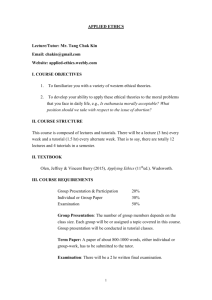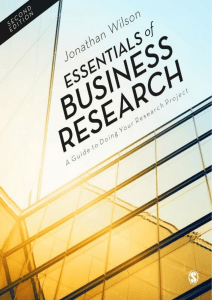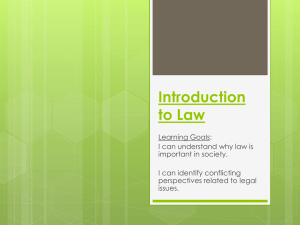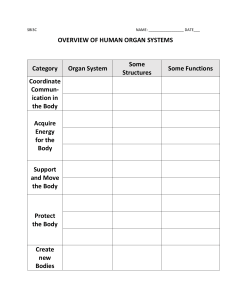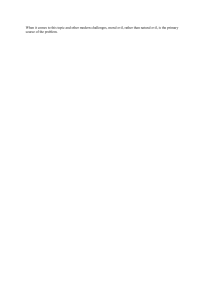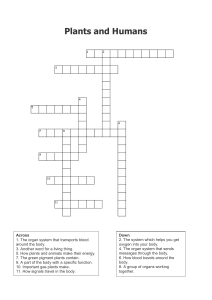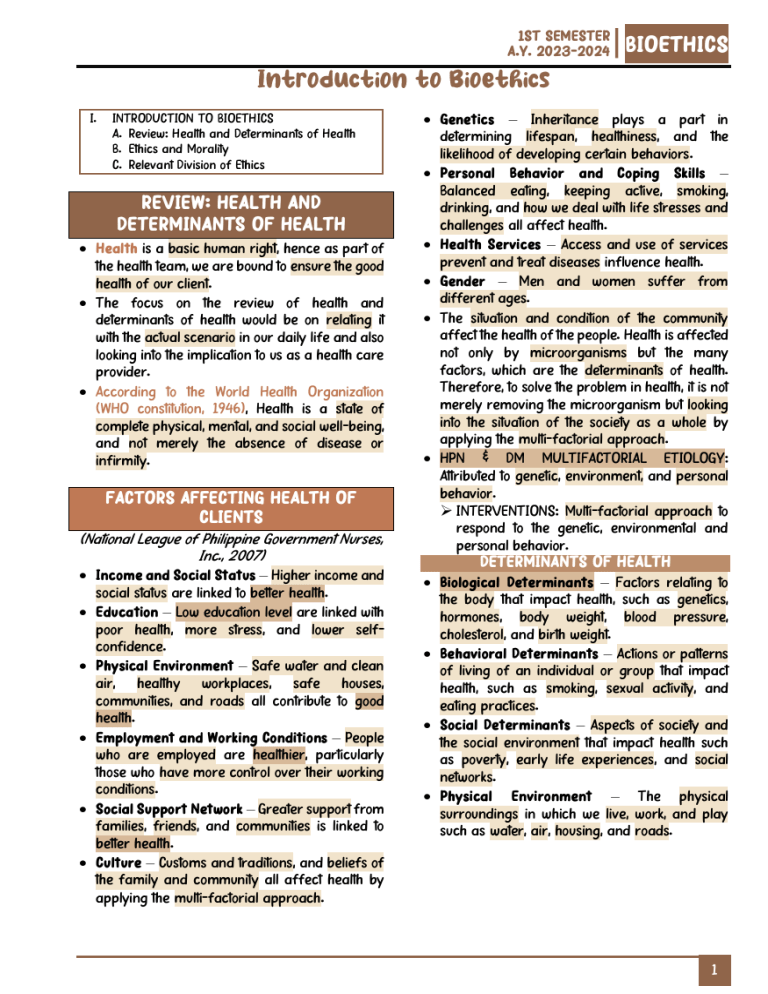
|BIOETHICS 1ST SEMESTER A.Y. 2023-2024 I. INTRODUCTION TO BIOETHICS A. Review: Health and Determinants of Health B. Ethics and Morality C. Relevant Division of Ethics REVIEW: HEALTH AND DETERMINANTS OF HEALTH • Health is a basic human right, hence as part of the health team, we are bound to ensure the good health of our client. • The focus on the review of health and determinants of health would be on relating it with the actual scenario in our daily life and also looking into the implication to us as a health care provider. • According to the World Health Organization (WHO constitution, 1946), Health is a state of complete physical, mental, and social well-being, and not merely the absence of disease or infirmity. FACTORS AFFECTING HEALTH OF CLIENTS (National League of Philippine Government Nurses, Inc., 2007) • Income and Social Status – Higher income and social status are linked to better health. • Education – Low education level are linked with poor health, more stress, and lower selfconfidence. • Physical Environment – Safe water and clean air, healthy workplaces, safe houses, communities, and roads all contribute to good health. • Employment and Working Conditions – People who are employed are healthier, particularly those who have more control over their working conditions. • Social Support Network – Greater support from families, friends, and communities is linked to better health. • Culture – Customs and traditions, and beliefs of the family and community all affect health by applying the multi-factorial approach. • Genetics – Inheritance plays a part in determining lifespan, healthiness, and the likelihood of developing certain behaviors. • Personal Behavior and Coping Skills – Balanced eating, keeping active, smoking, drinking, and how we deal with life stresses and challenges all affect health. • Health Services – Access and use of services prevent and treat diseases influence health. • Gender – Men and women suffer from different ages. • The situation and condition of the community affect the health of the people. Health is affected not only by microorganisms but the many factors, which are the determinants of health. Therefore, to solve the problem in health, it is not merely removing the microorganism but looking into the situation of the society as a whole by applying the multi-factorial approach. • HPN & DM MULTIFACTORIAL ETIOLOGY: Attributed to genetic, environment, and personal behavior. ➢ INTERVENTIONS: Multi-factorial approach to respond to the genetic, environmental and personal behavior. DETERMINANTS OF HEALTH • Biological Determinants – Factors relating to the body that impact health, such as genetics, hormones, body weight, blood pressure, cholesterol, and birth weight. • Behavioral Determinants – Actions or patterns of living of an individual or group that impact health, such as smoking, sexual activity, and eating practices. • Social Determinants – Aspects of society and the social environment that impact health such as poverty, early life experiences, and social networks. • Physical Environment – The physical surroundings in which we live, work, and play such as water, air, housing, and roads. 1 BIOETHICS 1ST SEMESTER | Prevalence of Bioethical Issues HEALTH is a BASIC HUMAN RIGHT as affirmed IMPORTANCE OF ETHICS by the following: • According to the Universal Declaration of Human Rights Article 25 sec 1: “Everyone has the right to a standard of living adequate for the health and well-being of himself and of his family including food, clothing, housing, and medical care and necessary social services and the right to security in the event of unemployment, sickness, disability, widowhood, old age or other lack of livelihood in circumstances beyond his control.“ • As stated in the Philippine Constitution Article XIII sec 11: “The State shall adopt an integrated and comprehensive approach to health development which shall endeavor to make essential goods, health and other social services available to all the people at affordable cost. There shall be a priority for the needs of the underprivileged sick elderly, disabled, women, and children. The State shall endeavor to provide medical services to paupers.“ • It teaches us to distinguish what is right from what is wrong. • It helps to make the right judgments and decisions in a given situation. ETHICS AND MORALITY ETHICS • Comes from the Greek word “ethos“ which means moral duty. • Refers to making choices that are best for the individual or society at certain times and in particular situations and then evaluating such choices and outcomes. • Ethics has several meanings (Kosier and Erbs, Chapter 5): ➢ It is a method of inquiry that helps people to understand the morality of human behavior such as the study of morality. o It studies how people make judgments in regard to right or wrong. ➢ Refers to practices or beliefs of a certain group such as nursing ethics and medical ethics. ➢ Refers to the expected standards of moral behavior of a particular group as described by the professional code of ethics. MORALITY • The Greek work “moralis“ refers to a social consensus about moral conduct for human being and society. • It also refers to private, personal standards of what is right and wrong in conduct, character, and attitude. • Morality is not the same as law. • Law reflects the moral value of a society and offers guidance in determining what is moral but an action may be legal but not moral. RELEVANT DIVISION OF ETHICS BIOETHICS • A science that deals with the study of the morality of human conduct concerning human life from the moment of its conception to its natural end. • Originally, bioethics was concerned with ethical issues described with medical practice, it has expanded to issues surrounding health and biological sciences and social issues including environmental concerns. NURSING ETHICS • It is the examination of all ethical and bio-ethical issues from the perspective of nursing theory and nursing ethics. • It includes duties or behavior of the members of the nursing profession toward their co-nurses, to their profession, to other health care workers, to the patients, and to the public in general. PROFESSIONAL ETHICS • Includes the moral duty or obligation which a member of the profession owes to the public, to his profession, to his colleagues, and to his clients. 2 |BIOETHICS 1ST SEMESTER A.Y. 2023-2024 II. PREVALENCE OF BIOETHICAL ISSUES A. Abortion B. Organ and Tissue Transplant C. End-of-Life Decisions 1. Euthanasia and Assisted Suicide Euthanasia 2. Termination of Life-Sustaining Treatment D. Cost-Containment Issues E. Breaches of Client Confidentiality ABORTION • The expulsion of the human fetus before the period of viability which is 24-48 weeks or towards the end of 7 months. • Viability is the period when the human fetus can have the ability to survive outside the uterus with or without medical assistance. • Abortion is generally classified as direct or intentional such as induced abortion and indirect or unintentional such as miscarriage. • There are different types of abortion which are either intentional or unintentional. TYPES OF ABORTION COMPLETE • All the parts of the pre-born child and placenta are expelled. INCOMPLETE • Some parts of the pre-born child and placenta remain in the uterus. INDUCED ABORTION • Intentional either through mechanical or chemical means such as injecting a chemical consisting of either saline, urea, or prostaglandin through the abdomen into the amniotic sac. • The chemical solution induces uterine contractions that expel the fetus. INFECTED OR SEPTIC ABORTION • It is associated with an infection of the uterus or genital tract. SPONTANEOUS ABORTION • Miscarriage, unintentional cause by diseases or accidents. ➢ Toxoplasmosis, a protozoal infection, and listeriosis, a bacterial infection could cause miscarriage, death of the fetus, and serious birth defects. THERAPEUTIC • Deliberately inducing expulsion of a living fetus to save the mother on death brought about by pregnancy. EUGENIC ABORTION • Recommended in cases where certain defects are discovered in developing fetus. GENERAL POINT OF VIEW TO CONSIDER CONSERVATIVE • Abortion is never permissible however it may be allowed if the reason outweighs the action like saving the mother’s life. LIBERAL • Abortion is always permissible. • It gives the right of a woman to make a decision that affects her own body. • It advocates the right of women to selfdetermination. MODERATE POSITION • Abortion is permissible in certain stages of fetal development. • Some believe that ensoulment occurs from the moment of conception, therefore, a newly fertilized ovum is already a person, and abortion in this stage is considered morally wrong. • Some also believe that ensoulment occurs later stage of fetal development, therefore eugenic abortion may be morally right. PRO-LIFE AND PRO-CHICE • Pro-Life – Disapproves abortion because of the physical, psychological, and spiritual effects. • Pro-Choice – Approves abortion because of personal, social, and fetal reasons. • Debate occurs opposing the principle of sanctity of life against the principle of autonomy and woman’s right to control her own body. • Abortion in the Philippines is a crime. • The human being is to be respected and treated as a person from the moment of conception and, therefore from the same moment his right as a person must be recognized and safeguarded. 3 BIOETHICS 1ST SEMESTER | Prevalence of Bioethical Issues ORGAN AND TISSUE-TRANSPLANT • The organ or tissue transplantation may come from the human living or the dead donors and also from other species like pigskin (xenograft). • Ethical issues include the allocation of organs, selling of body parts, involvement of children as potential donors, consent, clear definition of death, and conflicts of interest between potential donors and recipients. • Organs that can be donated include the liver, kidney, pancreas, heart, and etc. ORGAN DONATION AND TRANSPLANTATION • Organ Donation – Process of surgically removing an organ or tissue from one person (the organ donor) and placing it into another person (the recipient). • Transplantation – Necessary because the recipient’s organ has failed or has been damaged by disease or injury. • Organ transplantation is one of the great advances in modern medicine. Unfortunately, the need for organ donors is much greater than the number of people who actually donate. • Every day in the United States, 21 people die waiting for an organ and more than 107,380 men, women, and children await life-saving organ transplant. WHAT ORGANS AND TISSUES CAN BE TRANSPLANTED? • Liver • Lung • Bone • Kidney • Intestine • Bone marrow • Pancreas • Corneas • Heart valves • Heart • Middle ear • Connective tissue • Vascularized composite allografts WHO CAN BE AN ORGAN DONOR? • People of all ages should consider themselves potential donors. • When a person dies, they are evaluated for donor suitability based on their medical history and age. The organ procurement organization determines medical suitability for donation. HOW DO I BECOME A DONOR • You might join a donor registry. • Sign and carry an organ donor card. • Let your family members and loved ones know you’d like to be a donor. • You might also want to tell your family healthcare provider, lawyer, and religious leader that you’d like to be a donor. PHILIPPINE ORGAN DONATION AND ITS TRANSPLANT PROGRAM • The organ donation and transplantation are significantly low in this country. • The inadequate knowledge of people about organ donation and transplant, along with limited workforce and facilities that can handle these operations are factors that result in the low rate. • Moreover, organ trafficking is prevalent mainly due to poverty. Hence, this program aims to facilitate and oversee all organ donation and transplantation activities in the country with a goal of National Self-Sufficiency in Organ Donation and Transplantation and Prevention of Organ Trafficking. WHAT ORGANIZATION ACTUALLY MANAGES THE DISTRIBUTION OF ORGANS? • UNOS maintains the national Organ Procurement and Transplantation Network (OPTN). • Through the UNOS Organ Center, organ donors are matched to waiting recipients 24 hours a day, 365 days a year. • UNOS then generates a list of potential recipients, based on such factors as: ➢ Blood type. ➢ Tissue type. ➢ Organ size. ➢ Medical urgency of the patient’s illness. ➢ Time already spent on the waiting list. ➢ Geographical distance between the donor and the recipient. END-OF-LIFE DECISIONS EUTHANASIA AND ASSISTED SUICIDE EUTHANASIA • Euthanasia – Deliberate putting to death in an easy, painless way of an individual suffering from an incurable and agonizing disease (mercy killing). • Assisted Suicide – Giving the client the means to kill himself if requested. 4 BIOETHICS 1ST SEMESTER | Prevalence of Bioethical Issues • 2 Major Types of Euthanasia: ➢ Euthanasia by Commission or Active Euthanasia o It is the conduct of a measure to end the life of a suffering person with or without the patient’s consent. o E.g., Giving lethal dose injected into the terminally ill patient. ➢ Euthanasia by Omission or Passive Euthanasia o It is the withdrawal or omitting measures necessary to sustain the life of a suffering person with or without the patient’s consent. o E.g., Water and food are withdrawn to terminally ill patients. CASES OF EUTHANASIA SELF-ADMINISTERED • Active Euthanasia – The patient deliberately ends his life. ➢ E.g., The client drug pesticide to end his life. • Passive Euthanasia – The patient refuses to take anything to sustain life which will hasten his death. ➢ E.g., The client refuses to eat and drink food to hasten his death. OTHERS ADMINISTERED • Active and Voluntary Euthanasia – The act of commission by another person with the patient’s consent. ➢ E.g., The family gave an overdose medication to the client to hasten his death with client’s consent. • Passive and Voluntary Euthanasia – The act of omission by another person with the patient’s consent. ➢ E.g., The family removed the oxygen supply of the client with client’s consent. • Active and Involuntary Euthanasia – The act of commission to terminate a patient’s life by others without the patient’s consent. ➢ E.g., The family gave an overdose medication to the client to hasten his death without the client’s consent. • Passive and Involuntary Euthanasia – The act of omission to allow terminally ill patient to die as requested by others without the patient’s consent. ➢ The family removed the oxygen supply of the client without client’s consent. EUTHANASIA revolves around the preservation of human dignity in death even to the individual’s last breath but also erodes human dignity because it hastens the death of an individual. TERMINATION OF LIFE-SUSTAINING TREATMENT • Antibiotics, organ transplants, and technologic advances help to prolong life but not necessarily to restore health. ➢ Clients may request the withdrawal of lifesustaining treatment or the client may have it withdrawn through his advance directive or his appointed surrogate decision-maker. ➢ The patient and families of the patient must understand the life-sustaining treatment. ➢ Nurses must understand that a decision to withdraw life-sustaining treatment is not a decision to withdraw care. ➢ Nurses must ensure to provide care and comfort measures as the patient’s illness progresses. COST-CONTAINMENT ISSUES/ ALLOCATION OF SCARCE HEALTH RESOURCES • Allocation of limited supplies of health care goods and services, including organ transplants, test kits, and medicines has become an especially urgent issue as medical costs continue to rise and more stringent cost-containment measures are implemented. • The principle of justice could be utilized by the health care provider to choose what is most fair to all. • Nursing care is also a health resource in which, some hospitals have an inadequate number of nurses to give the level of care patients need. • Despite the shortage, the nurses must continue to provide the quality care needed by the clients. BREACHES OF CLIENT CONFIDENTIALITY • Nurses are obligated to respect the client’s privacy and confidentiality but, in some circumstances, some information about the patient is divulged to avoid epidemiological impact. 5 |BIOETHICS 1ST SEMESTER A.Y. 2023-2024 III. THE HUMAN PERSON A. Personhood B. Human Act and Acts of Man C. Elements Determining Morality D. Criteria for Moral Judgment E. Conditions Affecting Morality ➢ The act is intentional and willfully done. ➢ E.g., The student nurse administered the medication since she knew that it will help her patient recover. PERSONHOOD • An act that does not proceed from the deliberate free will of man. • Person – Composed of physical, intellectual, biochemical, and psychosocial needs. 2 RATIONAL FACULTIES TO CONSIDER • Intellect – It emphasizes that man tends towards the truth as his objective. Man is a rational being, acts with a purpose. • Freewill – Man tends towards the good as his objective. Man assumes to possess the ability to freely do his action, thoughts and has the power to refine, renew, or even restrain his actions and thoughts ACT OF MAN 3 ELEMENTS OF ACT OF MAN • No Element of Knowledge ➢ The act is not deliberately done. ➢ The person is not aware or conscious of what he is doing and what it means. ➢ E.g., A toddler placing dirty objects into his mouth. • No Element of Freedom ➢ Act not freely done. ➢ E.g., An act was done during daydreaming • No Element of Voluntariness ➢ No involvement of the will to decide the intent and to willfully do the act. HUMAN ACT AND ACTS OF MAN ELEMENTS DETERMINING MORALITY HUMAN ACT • Actions that man performs knowingly, freely and voluntarily to the control of the will. • Actions are deliberate, intentional, or voluntary. ELEMENTS OF HUMAN ACT • Knowledge ➢ The act is done based on the knowledge of the person. ➢ E.g., A student nurse learned how to do an intramuscular injection, then, later applied correctly to a patient in the clinical area. • Freedom ➢ The act is performed in accordance with the will. ➢ The will cannot decide to do a certain act without the intellect/knowledge. ➢ E.g., The student nurse decided to administer the IM injection to the patient as per doctor’s order considering the rights of the patient that she learned in class. • Voluntariness ➢ The act is a product of his knowledge and will, which help him make a decision. • The morality of an act is affected by the motive of the act and the circumstances it has happened. • The following criteria for moral judgment are recommended to consider either the act is good or evil. ➢ Act – Deed done or performed. ➢ Motive – End or purpose or goal to be achieved by utilizing the act. ➢ Circumstances – Condition at which the act is done affecting its morality in one way or another. CRITERIA FOR MORAL JUDGMENT • A good act which is done for a good motive becomes doubly good. ➢ E.g., A nurse performed a tepid sponge bath to a patient with a body temperature of 38°C to lower his body temperature. 6 BIOETHICS 1ST SEMESTER | The Human Person • An evil act which is done for evil motives doubly evil. ➢ E.g., A student nurse who documented the wrong blood pressure of the client to avoid discussion with the clinical instructor. • A good act which is done for an evil motive becomes evil. ➢ E.g., A student nurse volunteered to get the blood pressure of the patient of his classmate to show to the clinical instructor that his classmate is not doing well in the clinical area. • An evil act which is done for a good motive does not become good. The end does not justify means. ➢ E.g., A student nurse copied the previous nursing care plan of his classmate to be able to pass the subject. • Circumstances can make an act either good or evil. ➢ E.g., Singing to calm your pediatric client is either good or evil. It could be good if may be done in the day time where other pediatric clients may join but it could be evil if done at night when other clients are disrupted on their sleep. • Circumstances can never make an evil act good. ➢ E.g., Not wearing a facemask in public transportation during the COVID 19 pandemic because his facemask was misplaced. • Circumstances can make good or evil act better or worse. ➢ E.g., A nurse performed a sponge bath to a patient with a fever to decrease his body temperature and feel better but if the patient is currently having a seizure, performing the sponge bath may cause more injury to the client. CONDITIONS AFFECTING MORALITY IGNORANCE • Lacks required knowledge which human beings should have of his moral duty. INVINCIBLE IGNORANCE • When we do not know something that is impossible for us to know. • The person makes decisions out of ignorance but in good conscience having taken every precaution needed. • If fully informed, the person may have not performed the act. • E.g., The nurse on duty was not able to coordinate the change of diet of the patient to the dietary from soft to Diet as Tolerated since the oral order of the doctor was not endorsed by the outgoing nurse. The nurse on duty had contacted the doctor in-charge of any update of the doctor’s order but no mention of the change of diet that was previously ordered through a telephone call. VINCIBLE IGNORANCE • When we do not know something that we ought to know. • The knowledge could be acquired through ordinary effort but the person was not able to acquire it due to negligence or intentionally not acquired it. • E.g., The nurse has a strong doubt about the medicine ordered by the doctor and yet the nurse did not consult the doctor. CONCOMITANT/ AFFECTED IGNORANCE • When we do not know something but we would have done it anyway. • Ignorance occurs when the person positively wanted to be ignorant in order to plead innocent to a charge of guilt. • E.g., The nurse intentionally does not read notices to avoid certain regulations that are opposed to her plan. FEAR • A disturbance of the mind of a person who is confronted by an impending danger to himself or to his loved ones. • Acts done out of fear are voluntary but if fear is enormously great such in a situation between life and death wherein the person momentarily insane at the time the act is done out of intense fear or panic, the act may be considered as involuntary. • E.g., Killing someone in the act of self-defense in a life and death situation. 7 BIOETHICS 1ST SEMESTER | The Human Person VIOLENCE • It refers to any physical force exerted on a person by another person for compelling said person to act against its will. • E.g., A nurse who defended herself from the rapist and applied all physical powers to resist. The act of the nurse may be considered involuntary hence, no or lessened moral responsibility. HABITS • It is a lasting readiness, born of the frequently repeated act. • A habit could be bad and become vices while good habits will become virtues. • Habits are voluntary thus it does not destroy the voluntariness of the act. • E.g., A nurse who develops a habit to perform handwashing before handing a patient becomes a good quality of the nurse but a nurse who does not observe all the time proper handwashing is responsible for the cross-contamination as a result of his action. 8 |BIOETHICS 1ST SEMESTER A.Y. 2023-2024 IV. ETHICAL THOUGHTS A. Kantian Ethics B. Rawl’s Ethics C. Ross Ethics D. Natural Law Ethics KANTIAN ETHICS IMMANUEL KANT • Russian philosopher and had a major impact on the idealist philosophies of the 19th century. • He was born in April 1724 and died in February 1804. • He was more concerned with duty and reason. • He believed that the intentions behind an action are more important than the consequences because we cannot predict the consequences thus, we cannot judge a person good or bad based on the consequences of their action. MORAL PHILOSOPHY REASON/ GOODWILL • Goodwill is having a good intention. • An action cannot be good unless performed out of good intention or reason. • A person’s inward motive must be good for the action to be good. DUTY • A person is acting well if he performs his duty. • A person’s duty can differ depending on the situation they are in. • A person performs her duty as a teacher while in school then as a mother when at home. CATEGORICAL IMPERATIVE PRINCIPLE OF UNIVERSALIZABILITY • Kant argued that if a moral rule cannot be applied to all people at all times, then it is meaningless. • It should be applied equally to all people in all situations. • If stealing is wrong then anyone stealing wrong regardless of the consequence. RESPECT • Each person is a rational being, thus capable of making his own decision and respond to his action. • Each person is unique, irreplaceable, and deserves respect. • Respect yourself and all others as a person of worth and dignity. • Always treat humanity whether in ourselves or another person as an end in itself and never merely as a means to an end. AUTONOMY • It refers to the capacity of a rational individual to make an informed, un-coerced decision. • It is respecting a person’s capacity for acting freely. • Patient autonomy is the moral right on the part of the patient to self-determination concerning one’s own health care. • In the care of the patient, the health practitioners should respect the patient’s moral right to autonomous decision-making after the various and alternative medical treatments or remedies were presented to him. RAWL’S ETHICS JOHN RAWLS • One of the most prominent American philosophers of the 20th Century that introduces social justice. • He was working primarily in the areas of political philosophy and ethical theory. • He was a defender of political liberalism with the idea that government should be neutral with regards to the question of what constitutes a good life. • Rawls introduced social justice to recognize our duties to ourselves and to others. • He assumes that rational people would choose a strategy by which they could select from many alternatives that will elicit a result that would be better. • Kant’s ethics are about right and wrong actions. ➢ Is it ethical to lie on a job application to preserve legitimate privacy? 9 BIOETHICS 1ST SEMESTER | Ethical Thoughts • Rawls’ theory is about distributive justice. ➢ What is the ethically correct way to distribute benefits and burdens in society? THEORY OF JUSTICE • Every individual is inviolable (sacred/valued) that not even the general welfare of the society can override and supersede it. ➢ Each one is unique from the other. ➢ The greater good to be shared by all members, should not be used to justify the loss of freedom of others. ➢ Not to exploit or oppress other’s benefit. • An erroneous theory is tolerable in the absence of good ones. ➢ When given 2 erroneous alternatives, one should choose the better and the less erroneous one. ➢ Amputation of the gangrenous leg to avoid the spread of the cancer cells to the body. • Individual liberties should be restricted in order to maintain equality of opportunity. ➢ Restrictions are intended not to destroy but to preserve freedom; and amidst these restrictions, equality of opportunity among the citizens to develop themselves. ➢ Regardless of the socio-economic, cultural, political, and physical status of the patient, each is required to undergo an assessment before referred to the medical doctor. SOME PRINCIPLES OF JUSTICE THAT A NURSE SHOULD CONSIDER: • Every person has an equal access to basic human rights and liberties such in the following: ➢ Right to vote and to be eligible for public office ➢ Freedom of speech and peaceful assembly ➢ Liberty of conscience ➢ Freedom of thoughts ➢ Right of ownership ➢ Freedom from arbitrary arrest and seizure • Every person has fair equal of opportunity and distribution of basic services. ➢ Everyone should be given an opportunity for self-development or receive medical treatment. 4 DUTIES WHEN APPLYING JUSTICE IN HUMAN RELATION • Fairness in dealing with others – Consider that one person is unique from the other. • Fidelity – The nurse must be faithful and true to their professional promises and responsibilities by providing high quality, safe care in a competent manner. Do not give false assurance to the client. • Respect for person – You have to consider the uniqueness of the person. Consider the capability and abilities of the client in the provision of interventions. • Beneficence – It emphasizes that one should do well for other people. ROSS ETHICS WILLIAM ROSE • British Aristotelian scholar. • He considers Kant’s ethics’ absolute principles to be too rigid. • According to Ross, an action is wrong unless there is a good reason to do it. • Ross introduces the concept of prima facie duties which means that duties might have justified exceptions that are not so strict as compared to Kant’s categorical imperative. DISTINCTION OF ACTUAL DUTY AND PRIMA FACIE DUTY • Actual duty – It is the real duty in a given situation. • Prima facie duty – Moral code of six duties that Ross believes all humans would recognize as unwritten, socially binding contracts. These are not rules, but guidelines for moral action. 7 TYPES OF PRIMA FACIE DUTY • Duty of Fidelity – Being faithful to our duties, obligations, or vows. ➢ Telling the truth as the situation demands it, keeping actual and implicit promises, and not representing fiction as truth. • Duty of Reparation – The act of making amends, righting the wrongs we have done to others. • Duty of Gratitude – Appreciating and recognizing the services others have done for us, which may be either be a favor, kindness, good fortune, a great help, or saving one’s life. 10 BIOETHICS 1ST SEMESTER | Ethical Thoughts • Duty of Justice – Stresses the proper distribution of social benefits and burdens. • Duty of Beneficence – To bring about what is good for others but also to help them better their conditions with respect to virtue, intelligence, o comfort. • Duty of Self-Improvement – To improve and develop ourselves with respect to virtue, intelligence, and happiness. • Duty of Nonmaleficence – Avoiding inflicting evil, injury, or harm upon others as we would avoid doing so to ourselves. ULTIMATE GUIDE • Learn and discern the facts in the case. • Consider the possible consequences of our actions. • Reflect on our prima facie duties. • Decide on the best course of action under the circumstances. NATURAL LAW ETHICS (THOMISTIC ETHICS) ST. THOMAS AQUINAS • Italian Dominician philosopher. • Natural law ethics claims that there exists a natural moral law that is manifested by the natural light of human reason. • It says that human beings possess intrinsic values that govern our reasoning and behavior. NATURAL LAW ETHICS UNDERSCORE MAN’S THREEFOLD NATURAL INCLINATION SELF-PRESERVATION • An individual has the tendency to care for his health and not to kill himself or put others in danger. • Any act that promotes health, vigor, vitality (physical exercise, walking) is considered as good while suicide and self-immolation is considered as evil. JUST DEALINGS WITH OTHERS • Treat others with the same dignity and respect that we accord ourselves, like the golden rule: “Do unto others, what you want others to do unto you.“ • Exploitation, oppression, seduction, abduction, deception, swindling, cheating, kidnapping for ransom, murder, harassment, and intimidation are against human nature and considered evil. PROPAGATION OF OUR SPECIES • We are naturally inclined to perpetuate our species which is viewed as a natural good thus we are obligated not to pervert or thwart this natural inclination. DOUBLE EFFECT PRINCIPLE • The principle applies to a situation in which a good effect and an evil effect will result from a good action/cause. PRINCIPLE OF TOTALITY • Under natural law ethics, we have a natural obligation not only to preserve lives but also to preserve the integrity of our body. • The principle of totality would forbid the donation or selling of a healthy organ if such were to weaken the health of the donor. It is also in conflict with the natural inclination toward selfpreservation and would violate the sanctity of the individual person. PRINCIPLE OF STEWARSHIP • Declares that human life comes from God and no individual is the master of his/her own body. • Human is only merely stewards or caretakers with the responsibility of protection and cultivating spiritual and bodily function. PRINCIPLE OF THE INVIOLABILTY OF LIFE • States that life is God’s and has been loaned to us hence it is inviolable and sacred. • Only God has complete control and domination over life and our duty is to take care of it until God takes it back from us. PRINCIPLE OF SEXUALITY AND PROCREATIOR • It emphasizes the responsibility of husband and wife in the procreation and nurturing of children and it is also an expression of loving union and companionship. 11

